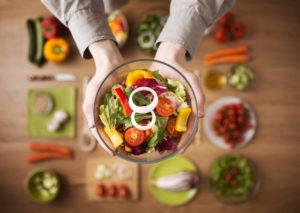Nourishing Yourself While Breastfeeding Your Baby
 Breast milk is a super food brimming with immune-boosting components like antibodies designed to fight specific infective agents and lactoferrin which provides you baby with iron but also seems to have anti-viral properties. According to the World Health Organization, breast milk is all your baby needs for his or her first six months. During this time, relax knowing that your baby is getting everything they need in terms of nourishment. All you need to do is feed yourself a wholesome diet and let your body do the work.
Breast milk is a super food brimming with immune-boosting components like antibodies designed to fight specific infective agents and lactoferrin which provides you baby with iron but also seems to have anti-viral properties. According to the World Health Organization, breast milk is all your baby needs for his or her first six months. During this time, relax knowing that your baby is getting everything they need in terms of nourishment. All you need to do is feed yourself a wholesome diet and let your body do the work.
How many more calories do I need while breastfeeding?
Rather than count calories, it’s more important for you to closely monitor your own appetite and eat when you are hungry. Practicing mindfulness in regards to your diet is one way to keep the urge to diet away and receive just what your body needs in terms of extra calories. Still tempted to calorie count? Know this: your breastfeeding body needs about the same amount of calories it did when you were in your last trimester of pregnancy which is about 300 to 500 extra calories a day. Nourishing food options that are 300 to 500 calories include:
- Two scrambled eggs
- Tossed chicken salad
- Two slices of whole grain avocado toast
- Tuna sandwich
What foods should I eat while breastfeeding?
The truth is simple: you don’t need a special diet to breastfeed. Listen to what your body is craving and choose the healthy options that may meet those cravings. Eat plenty of fruits and vegetables about 5 servings a day. A great way to ensure that you’re getting enough vegetables in to incorporate them into every snack and meal. Try a refreshing carrot and cabbage dish for lunch, sauteed spinach or rainbow chard at breakfast, and squash or eggplant with dinner. Carrots, celery, and snap peas all make great veggies to snack on while you’re on the go. Keep your diet rich in dark leafy greens to pump up your iron stores, which may have been depleted during childbirth.
Keeping fresh fruit around the house is one way to fight boredom snacking during the day. Sometimes, we reach a midday lull where, in our moments of low energy, we begin to crave sweets. Instead of reaching for a box of cookies, try grapes, apples, or oranges. If you need something sweet with a crunch, try celery sticks with peanut butter and raisins.
Starches are an important part of anyone’s diet, but they are especially necessary for a breastfeeding mother. Considered a complex carbohydrate, starches are found in grains, vegetables, and fruits. Starches provide your body with quick and easy to access energy. Following the sleepless nights and long days of having a newborn, you’ll soon understand the importance of getting quick energy from your food. Starches also provide fiber, which keeps your digestive tract regular and helps to regulate blood sugar levels. Some wonderful starch-filled food options include:
- Whole grain oatmeal with blueberries
- Baked potato with a light, low-fat dressing
- Black bean salad
- Curried lentils with brown rice
What about protein?
Protein is an essential part of any diet, without it we’d never be able to build the specific amino acids found in breast milk. Breastfeeding women should eat about 71 grams of protein a day. We recommend splitting this up into four snacks of about 12 to 15 grams of protein per dish. Some foods high in protein include:
- Two eggs, about 12 grams
- One half cup of chopped chicken breast, about 20 grams
- One half cup tempeh, about 16 grams
- One half cup black beans, about 19 grams
Do I need to take any supplements?
While you don’t need to take dietary supplements, they are a popular option for many women who feel their diet is lacking or who just want to be sure that their baby is getting what they need. However, the first rule of taking supplements while breastfeeding is running the product by your physician. It’s essential to ensure that whatever you’re ingesting is also safe for your baby.
While your body is careful to formulate your breast milk in a way which ensures your baby gets the nutrients he or she needs, this sometimes means your stores of these essentials are left lacking. Eating a well-rounded diet can help this, but you may also purchase supplements individually to meet your needs, or opt for a post-natal vitamin or continue to take your pre-natal vitamins. Look for supplements which include:
- Calcium
- Vitamins B2, B6 and B12
- Folic Acid
- Iron
- Magnesium
- Vitamin E
- Vitamin D
Again, talk to your physician before starting a supplement or vitamin regimen. They may have suggestions on improving your diet before having to take a daily pill. When it comes to eating while breastfeeding your baby, remember that your body is highly intuitive; it knows what it needs. Listen to your body and choose healthy, wholesome foods that keep you full and the quality of your breast milk will be just fine.
